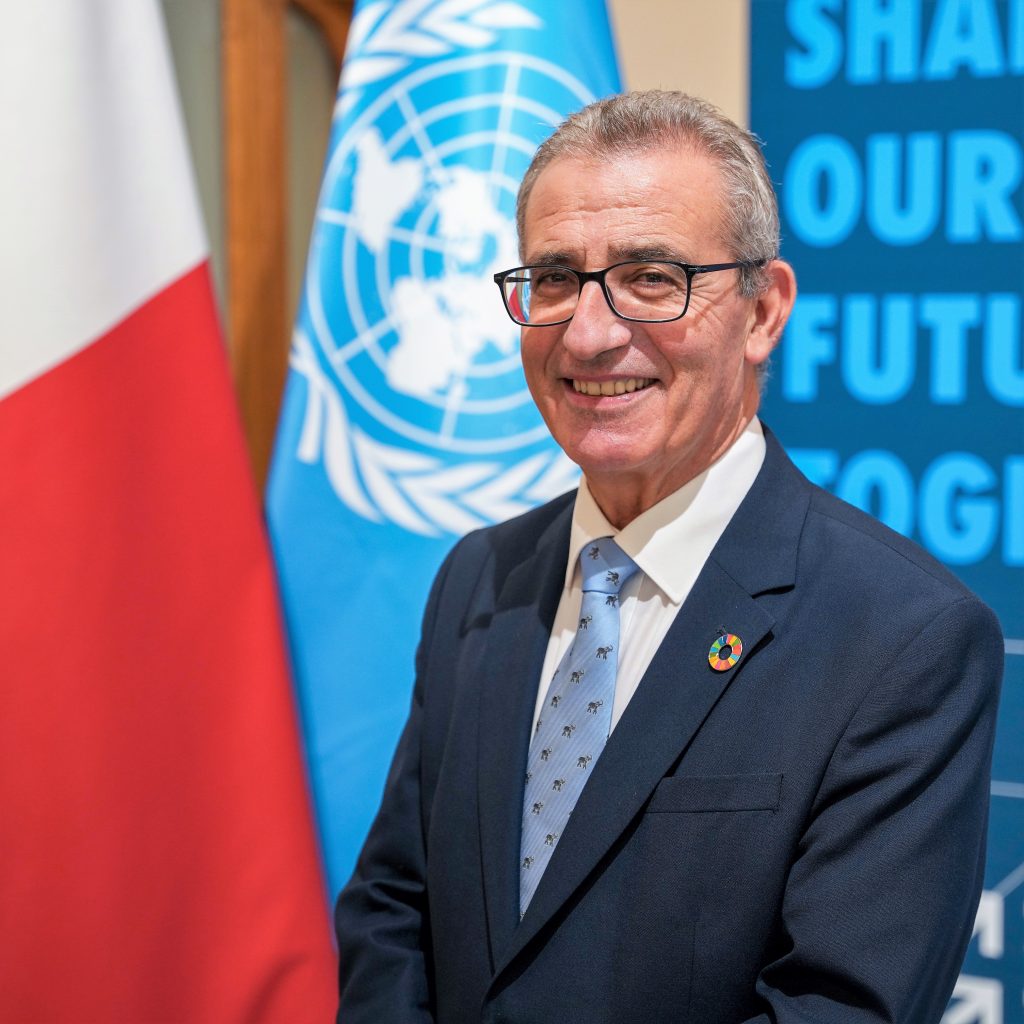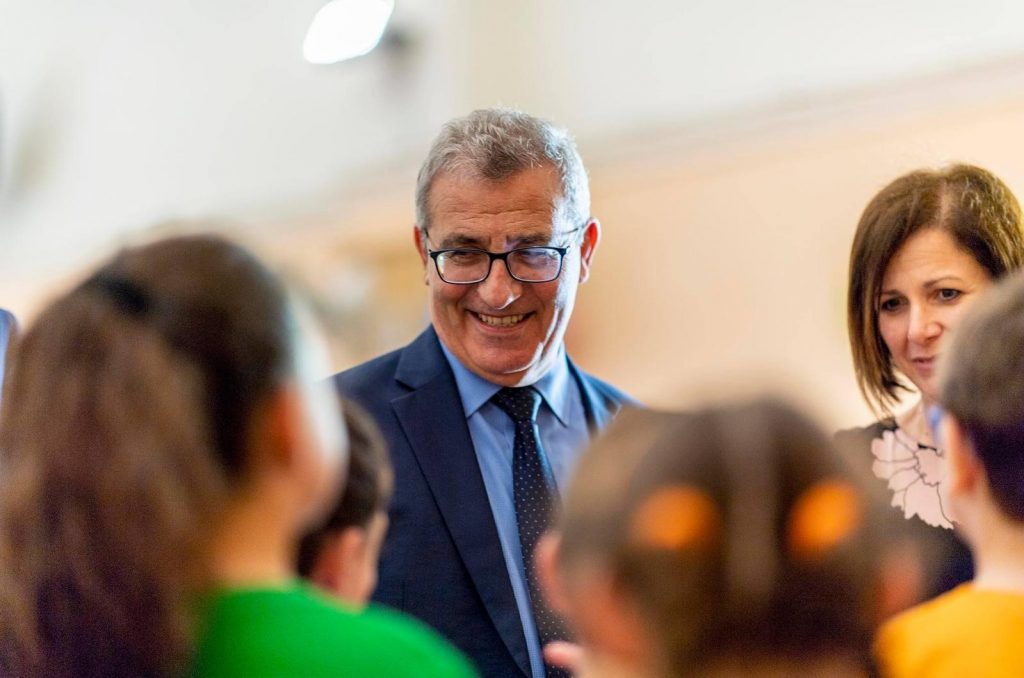EXCLUZIVE: Text by Svetlana Nenadovćc-Glušac, D&C Austria
We have one of the most open economies in the world as our home market, with fewer than 500,000 people, is too small to generate wealth and support job creation

The Maltese Foreign Minister, H.E. Evarist Bartolo, was to pay an official visit to Austria in early November. However, the unfavourable evolution of the pandemic caused by the SARS-Cov-2 virus made this visit impossible and his visit was postponed indefinitely. For the Diplomacy&Commerce magazine in Austria, we made an exclusive interview with the respected minister Evarist Bartolo, which we also publish entirely in Serbian edition. He spoke about diplomacy in the era of Covid-19, terrorism, the so-called “golden passports”, Malta’s official position on the issue of the migration crisis, and whether pandemic has had a profound impact on the Maltese economy and thus tourism.
How does this pandemic situation affect the work in international relations?
The inability to travel and meet face to face is a set back for diplomacy. Videoconferences are a poor substitute to meetings in person. Most of the videoconferences I have taken part in in the last 10 months have been a series of monologues, you do your bit and switch off and carry on with the work that you have even if you are still visible online. Physical meetings are important to build trust with a person to understand each other better and communicate beyond public and official positions, which are often sanitised, and more of the same.
I feel we need such meetings especially in this period where there is so much polarisation in the world and it is as if we have gone back to trench warfare of World War 1. It is as if we have lost the appetite for patient and persevering diplomacy where calls for dialogue, de-escalation and negotiation are interpreted as naïve.
I also think that defence ministries and the burgeoning presence of the military industrial complex, the most profitable economic sector in some countries are playing a disproportionate role in relations among states, seeking to increase arms exports rather than looking genuinely for compromise and conflict resolution, peace and stability.
On the day you were supposed to arrive in Austria, there was a terrorist attack in Vienna. Should the issue of terrorism be part of the OSCE conference?
Yes, I think that terrorism should be part of the OSCE conference. We should not consider terrorism just a security and law enforcement issue as this leads to a further militarisation of life and of relations among states. We must fight terrorism. As Che Guevara says: “terrorism … is generally ineffective and indiscriminate in its results, since it often makes victims of innocent people and destroys a large number of lives …”
We must also address the causes of terrorism: poverty, unemployment, social exclusion, injustice, human rights abuses, brutal military conflicts that lead to failed states, the institutional repression of minorities … this does not mean that terrorists are always the victims of injustice but there is no doubt that terrorism thrives and provides recruits among persons who have nothing to lose.
We are one world and a common human family. We should feel the pain and suffering of every person, whoever, wherever that person is
So political, social, economic and cultural measures are required to develop and implement a scorched earth policy around terrorist organizations. We must promote the dialogue of religions and the alliance of civilizations and must not fight religious fanaticism and fundamentalism with secular fanaticism. We need to promote the culture of the universal declaration of human rights that is needed today and tomorrow as much as it was needed 75 years ago. We must keep on making it clear that promoting a global human rights culture cannot be dismissed as interference in internal affairs.
We are one world and a common human family. We should feel the pain and suffering of every person, whoever, wherever that person is.
The best way to celebrate the 75th anniversary of the United Nations is to commit ourselves to this declaration and work to make these human rights happen everywhere in today’s world.
Last month the EU Commission initiated infringement proceedings against Malta and Cyprus. It is about the so-called “golden passports” for the issuance of citizenships against financial commitments, what is the official position of the Republic of Malta about this procedure?
Small islands like Malta that are constrained by a lot of disadvantages and have a very limited range of economic sectors that they can develop, need schemes that attract investors which include granting them citizenship. But in running these schemes we must take all the necessary measures not to let them be used for money laundering and to hide the proceeds of economic crimes committed in other countries.
We have taken new measures to tighten our scheme and will insist with the European Commission that the granting of citizenship is a national competence and we will not cede our sovereignty.

What is the official position of Malta on the issue of the migration crisis, particularly that from the Central Mediterranean route?
We are the smallest and most densely populated country in the EU. We are also the most vulnerable as we are right in the middle of the Central Mediterranean migratory route where departures from Libya and Tunisia have more than trebled this year. We do not have the carrying capacity to take in more migrants that are irregular and becoming a migrant reception centre for Europe will destroy our economy and livelihood for our people.
Everyone tells us that we must not be allowed to carry our burden on our own. Yet this is what often happens. Relocation has helped a bit but has certainly not solved our problems. In 15 years, our European Union partners took 8% only of our arrivals. The difficult times we are in, Covid-19 and suffering, anxiety and economic uncertainty it has brought with it and the prevailing mood of European voters are making it more difficult for our European partners to take their share of irregular migrants that reach our shores.
Islands like Malta that have a very limited range of economic sectors they can develop, need schemes that attract investors which include granting them citizenship
As human traffickers continue to send more migrant boats from North Africa towards Europe, we are caught between two extremes, which we both reject: let them drown and let them all in. We do not want to do either. However, we have no alternative to cooperate with Libya to intercept and take back the boats of irregular migrants. This year we have had over two thousand irregular migrants coming to Malta. Proportionately, that is the equivalent of two million arriving in the European Union.
Without the help of Libya, over 9,000 would have arrived and it would be a huge crisis and emergency for us, which we cannot allow to happen. We understand that irregular migration is a complex problem and those who provide simple solutions are not realistic. First, half of those who come to Malta are not eligible for asylum.
While we need to have safe and regular migration, we must do all we can to stop irregular migration and send irregular migrants back to where they came from. And we need to help each other to do that as quickly as possible.
We know that the other side of irregular migration is joblessness. We need to engage economically with the countries of origin and have terms of trade that allows them to create wealth and jobs so that young people work in countries where they are born. We must allow these countries of origin to move into manufacturing and services. We need to help transit countries manage their borders better to prevent the human traffickers from carrying out their criminal business. We need to take on and attack and bring to justice the human traffickers wherever they are. We must ensure that the centres where irregular migrants are kept till their applications are processed are centres where all the persons are treated humanely. Relocation remains essential for those who deserve protection and asylum.
People having to leave their country is a symptom of bigger problems: unemployment, wars, persecutions, corruption, illicit financial flows from Africa, bad governance, climate change, injustice … treating the symptom without addressing the causes is very short sighted and it is just like putting our finger in the dyke.
Malta not only attracts with its history, culture and nature, it is also an attractive year-round travel destination for continental Europeans. Has the pandemic reduced the number of visits to Malta this year and is Malta ready for a “new normal” in tourism?
The pandemic has hurt us a lot as up to 30% of our economy is directly or indirectly related to tourism so our income from tourism this year will be down by around 75%. We have the economic sectors that are most exposed to the economic impact of the pandemic. This has not led to thousands of unemployed and families have slipped into poverty because we have taken strong measures to subsidise wages and to transfer money to families to generate consumption and domestic trade.
We have one of the most open economies in the world as our domestic market of less than 500,000 people is too small to support wealth and job creation. For us globalization is not an ideology, it is a necessity. We will only survive and thrive if we manage to sell out services and products to as many different countries as possible.
There are as many Maltese in the rest of the world as there are in Malta as thousands of Maltese had to emigrate to look for a job. This trend has been reversed. We have the lowest birth rate in Europe. We were creating 11,000 jobs a year of which the Maltese could fill only 4,000 while the remaining 7,000 had to come from overseas.
During your stay in Vienna you were going to deliver a lecture on the subject of “Being small in a big world. Are we all small?” Will you let us know which thesis you intended to propose in your presentation?
While Malta is a tiny dot in the Central Mediterranean, the world is a tiny blue dot in the universe. Most of the problems that we face cannot be addressed adequately by any one country alone: the climate emergency, pandemics, the debt crisis, Post-Covid economic recovery, international organized crime, terrorism, irregular migration, technological disruption, conflicts among neighbouring countries … all countries are small when they are dealing with these big challenges and we must work together to face them successfully